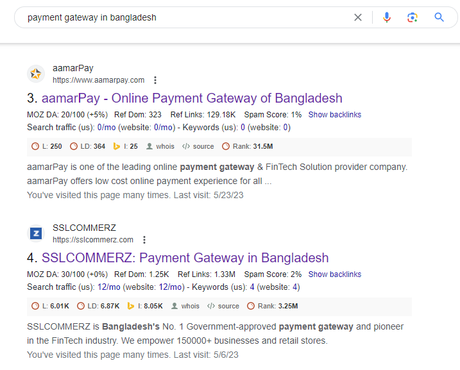
There are many SEO tools for checking your website's SEO. We get information about our SEO status and how to improve. But sometimes these tools cannot provide the right direction for your SEO success. That's why manual SEO check is crucial. You have to develop an SEO strategy as per the manual SEO check report. In this context, I will talk about the importance of manual SEO checks as well as the importance of developing an SEO strategy for your next SEO campaign.
Let's jump into the deep:
An SEO Case Study
A few days ago, I checked 2 websites and then I realized the importance of manually SEO checking. The target keywords were "Payment Gateway in Bangladesh" and the 2 websites were aamarpay and sslcommerz. With the said keywords first 2 positions are held by 2 different blogs and 3rd position holds the payment gateway service provider aamarpay and the 4th position holds by the most prominent and popular payment gateway service provider in Bangladesh, SSL Commerz.

In this case, I found that aamarpay on-page SEO score is lower than SSL Commerz, domain authority, page authority as well as domain age were also lower.
But with the said target keywords aamarpay enjoys a higher ranking than SSL Commerz.
Why aamarpay enjoying a higher ranking with a low SEO score?
I have checked both websites thoroughly. After manually SEO checking I understood why Google likes aamarpay than SSL Commerz for the said and relevant keywords.
Aamarpay has an app and it provides an app download facility from its homepage. Another important point is aamarpay provides a demo video about how to use aamarpay.
On the other hand, SSL Commerz didn't provide any app download facility and also didn't show any demo video about how to use SSL Commerz.
The above 2 points made a big difference and these 2 points I found from manual SEO checking. Here I'm sharing the importance of manually SEO checking.
Importance of Manually SEO Check
Manual SEO checking is an essential practice for ensuring the effectiveness and success of your website's search engine optimization (SEO) efforts. While automated tools and software can provide valuable insights, manual checks allow you to have a more comprehensive and nuanced understanding of your website's performance in search engine results. Here are some key reasons why manual SEO checking is important:
Accuracy and Precision:
Manual checks enable you to review and analyze specific website elements with greater accuracy and precision. You can assess factors such as meta tags, headings, content relevance, keyword usage, and internal linking structures more effectively. This hands-on approach allows you to ensure that your SEO elements are correctly implemented and optimized according to best practices.
User Experience Optimization:
SEO is not just about rankings and visibility; it also plays a crucial role in enhancing user experience. By manually reviewing your website, you can assess the accessibility, navigation, and overall user-friendliness of your site. This includes evaluating page load speed, mobile responsiveness, readability, and ease of finding relevant information. Improving the user experience positively impacts your website's SEO performance.
Competitive Analysis:
Manual SEO checks enable you to conduct detailed competitive analyses. By manually reviewing competitor websites, you can identify their strengths, weaknesses, and strategies. You can analyze their content, keyword usage, backlink profiles, and overall, SEO approach to gain insights into areas where you can improve or differentiate your own website.
Algorithm Updates:
Search engine algorithms evolve constantly, and manual SEO checking allows you to stay up to date with these changes. By monitoring your website's performance and comparing it to industry best practices, you can identify any negative impacts from algorithm updates and take corrective actions. Manual checks help you adapt your SEO strategies to align with the latest search engine guidelines and ranking factors.
Local SEO Optimization:
For businesses targeting specific geographical areas, manual SEO checking becomes even more critical. By manually reviewing your website's local SEO elements, such as location-specific keywords, business listings, and customer reviews, you can ensure your website is effectively optimized for local search. This helps improve your visibility in local search results and increases the chances of attracting relevant local traffic.
Identifying Technical Issues:
Automated SEO tools may not always capture all technical issues that could affect your website's SEO performance. By manually inspecting your website, you can identify technical issues like broken links, duplicate content, crawl errors, and other issues that may hinder search engine crawlers from indexing your pages properly. Correcting these technical issues can improve your website's overall SEO health.
Manual SEO checking provides you with a more thorough understanding of your website's SEO performance, enables optimization for user experience, allows competitive analysis, helps adapt to algorithm updates, optimizes for local search, and identifies technical issues. By combining manual checks with automated tools, you can develop a comprehensive SEO strategy and continually improve your website's search engine visibility and performance.
Importance of Developing SEO Strategy for a Successful SEO Campaign
Developing an SEO strategy plays a vital role in a successful SEO campaign. It provides a structured and goal-oriented approach to improve your website's visibility, organic traffic, and overall search engine rankings. Here are the key reasons why developing an SEO strategy is important:
Clear Goals and Objectives:
An SEO strategy helps you define clear goals and objectives for your campaign. It enables you to identify what you want to achieve through SEO, such as increasing organic traffic, improving keyword rankings, or boosting conversions. Clear goals provide direction and focus for your efforts, making it easier to measure success and track progress.
Targeted Keyword Research:
A well-developed SEO strategy includes thorough keyword research. This involves identifying relevant keywords and phrases that your target audience is using to search for products, services, or information related to your business. By understanding the search intent behind keywords, you can optimize your website's content and structure to align with user expectations and improve your chances of ranking well in search engine results.
On-Page Optimization:
An SEO strategy helps you plan and execute on-page optimization techniques. This involves optimizing various elements on your web pages, such as meta tags, headings, URLs, content, and internal linking, to improve their relevancy and visibility in search engines. A strategic approach ensures that these elements are consistently optimized across your website, enhancing its overall SEO performance.
Content Strategy:
High-quality and relevant content is the backbone of successful SEO. An SEO strategy guides the development of a content strategy that focuses on creating valuable, informative, and engaging content for your target audience. It helps you identify content topics, formats, and distribution channels that align with your audience's interests and search behavior. A content strategy supports your SEO efforts by attracting organic traffic, earning backlinks, and establishing your website as a credible source of information.
Link Building:
Building a strong backlink profile is essential for improving your website's authority and search engine rankings. An SEO strategy outlines a systematic approach to acquiring high-quality backlinks from authoritative and relevant websites. It may involve outreach, content partnerships, guest blogging, or other link building tactics. A strategic link building plan helps you focus on acquiring links that have a positive impact on your website's SEO while avoiding low-quality or spammy links.
Technical Optimization:
An SEO strategy addresses technical aspects that impact your website's visibility and crawling by search engines. It includes optimizing factors such as website speed, mobile responsiveness, site architecture, URL structure, XML sitemaps, and robots.txt files. A technically optimized website ensures that search engine crawlers can access and index your content efficiently, leading to improved visibility in search results.
Monitoring and Analysis:
An SEO strategy includes regular monitoring and analysis of key metrics and performance indicators. It helps you track the impact of your SEO efforts, identify areas for improvement, and make data-driven decisions. Monitoring tools and analytics provide insights into organic traffic, keyword rankings, conversion rates, and user behavior. This information allows you to refine your strategy, make necessary adjustments, and optimize your website's SEO performance over time.
Developing an SEO strategy is crucial for a successful SEO campaign as it provides clear goals, enables targeted keyword research, guides on-page optimization and content strategy, supports link-building efforts, addresses technical optimization, and facilitates ongoing monitoring and analysis. A well-defined strategy ensures that your SEO efforts are focused, measurable, and aligned with your business objectives, resulting in improved visibility, organic traffic, and online success.
End Words
If you want a successful SEO campaign, you have to audit the website with SEO tools as well as manually. Manual SEO checking helps you to understand the website's UI and UX. As per the SEO audit result and competitor analyses you have to develop a unique SEO strategy for a successful SEO campaign. I hope you understand the importance of developing SEO strategy.

